Table of Contents
If you’re planning a trip to Vietnam for 1, 2, or 3 weeks then you must start with this post to help plan your Vietnam itinerary.
Vietnam has something for everyone. It’s bursting with history, delicious foods, hiking opportunities, beautiful landscapes, beaches, and of course the wonderful Vietnamese people.
Our Vietnam itinerary guide will give you an overview of the country, with some great itinerary options depending on how long you plan to visit.
We have something for everyone with:
- 10 days in Vietnam: Highlights Itinerary – These are the must-see places in Vietnam
- 1 week in Vietnam focusing on the North
- 1 week in Vietnam focusing on the South
- 2 weeks in Vietnam by combining the two above
- 3 weeks in Vietnam, or longer, by adding our extended options to your itinerary.
READ MORE: Don’t miss our complete guide to travelling in Vietnam!
| 10 Day Highlight | 1 Week (North) | 1 Week (South) | 2 Week |
3 Week | |
| Hanoi | X | X | X | X | |
| Halong Bay | X | X | X | X | |
| Sapa | X | X | X | X | |
| Hue | X | X | X | X | |
| Hoi An | X | X | X | X | |
| Ho Chi Minh | X | X | |||
| Da Nang | X | X | |||
| Nha Trang | X | ||||
| Dalat | X | ||||
| Mui Ne | X | ||||
| Phu Quoc | X | ||||
| Ninh Binh | X | X | |||
| Phong Nha | X | X | |||
| My Son | X | X | |||
| Ba Be National Park | X | X | |||
| Back Ma National Park | X | X | |||
| Dong Ha | X | X | |||
| Mekong Delta | X | X | |||
| Con Dao Island | X | X | |||
| Can Tho | X | X | |||
| Qui Nhon | X | X | |||
| Cat Tien National Park | X | X |
1, 2, and 3-Week Vietnam Itinerary Options
We broke this Vietnam Itinerary into three main sections.
Simply decide how long you have, and use one of our itineraries to guide you to the top things to do in Vietnam!
10 Days in Vietnam Itinerary: Vietnam Highlights
Our 10 days in Vietnam itinerary will highlight the absolute best of North and South Vietnam – from hiking in Sapa, to sinking beer in lively Ho Chi Minh City (more commonly referred to by its former name, Saigon).
This can be the core of a longer 2 or 3-week journey by adding extension opportunities to it.
You can do this trip from North to South, or in reverse.
Day 1 – Hanoi
After flying into Hanoi, you’ll have one day to see this beautiful city, so get ready to hit the ground running.
Hanoi is the capital of Vietnam and is full of beautiful architecture, culture, and unique food. The old city is surrounded by remnants of fortified walls, and most things you will want to visit are in the Old Quarter.
I would suggest finding a walking tour, so you can learn about the city’s history as you explore the city.
Take a stroll around the Hoàn Kiếm Lake and visit the Temple of the Jade Moutain, and stop to help the locals practice their English.
Try the local beer called Bia hơi or fresh beer, which is brewed fresh each morning, and doesn’t contain any preservatives.
One of the best things to do in Hanoi is to have an egg coffee while sitting at a café in Hanoi’s Train Street.
Then get ready to get out the way when the train rattles past, so close to you that it takes your breath away!
For dinner, don’t forget to have a regional specialty, called Bun Cha. It’s found all through the old quarter, so you won’t have to go far to find it.
Where to stay in Hanoi: We recommend staying right in the Old Quarter.
READ MORE: Learn more about what to do in Hanoi with our Hanoi city guide.
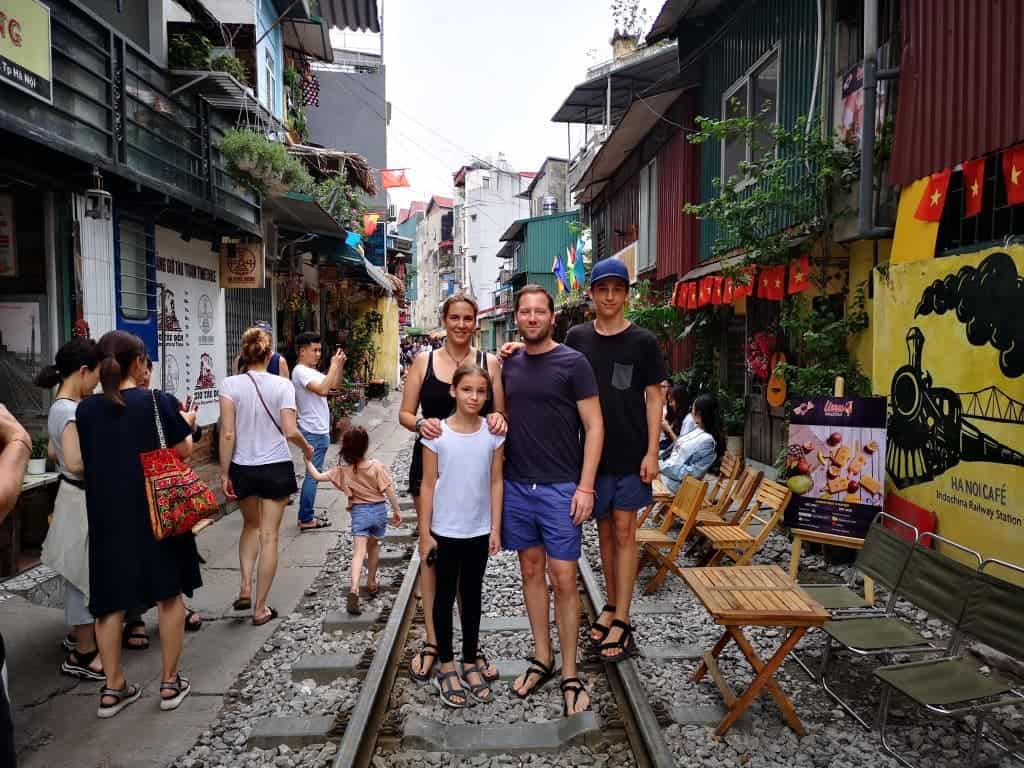
Day 2 and 3 – Halong Bay
Halong Bay is a UNESCO World Heritage Site, and is one of the most popular things to see in Vietnam.
The stunning bay is full of thousands of limestone islands, pristine beaches, caves, and floating villages. The Vietnamese call it The Bay of the Descending Dragons.
One of the best ways to visit the islands is by boat.
You can take one of the many cruises on offer from the tour operators in town, taking you from Hanoi to Halong Bay, spending a night onboard a boat, and returning you to Hanoi the following day.
Alternatively, make your own way to Halong Bay, and arrange a boat from there.
Halong Bay cruise options vary depending on your budget.
The cruises normally include kayaking, stand up paddleboarding, swimming, visiting floating villages, and exploring caves.
If you find the Halong Bay cruises a little out of your budget, check out this guide to Halong Bay on a budget.
Where to stay in Ha Long Bay: Spend the first night at Halong bay, preferably on board a junk boat. Alternatively, spend the night on Cat Ba Island. Return to Hanoi, and spend the second night there, ready to head to Sapa in the morning.
Day 4 and 5 – Sapa
After a restful night in Hanoi after your cruise, and having enjoyed some more Bun Cha and fresh beer, it’s time to get on a bus from Hanoi to Sapa.
You can also travel by train if you prefer, but buses are the fastest and the best way to get to Sapa from Hanoi.
Alternatively, you can hire a private car, which will get you there faster, but at considerably more expensive.
Sapa is a region in Vietnam’s northwest and is home to beautiful terraced rice fields, great trekking, and exquisite vistas.
Sapa has some of the best trekking in Vietnam.
You can navigate some of these hikes yourself, arrange a private guide, or organize one of the many tours, either from Hanoi or in Sapa itself.
The most popular attraction in Sapa is the highest mountain in the region, Fan Si Pan.
But unless you take the cable car to the top, you’ll need more time in the area for this hike.
Some of the shorter day hikes are Cat Cat, and Tả Phìn, which can be done with or without a guide.
Where to stay in Sapa: Spend two nights in Sapa. Consider a mountain lodge for the true Sapa experience, and then hop on the bus back to Hanoi early the following day. Then fly from Hanoi to Hue. If you would prefer not to fly, you can take an overnight train or bus from Hanoi to Hue instead, arriving in the morning of Day 7.
Day 6 and 7 – Hue
Hue is the old Imperial City, and is where the Nguyen Dynasty held the throne for 143 years.
The last Emperor, Bao Dai, abdicated his throne and power passed to Ho Chi Minh.
During the American War, the North Vietnamese Army captured Hue as part of the Tet Offensive.
Thus began a battle to regain the Imperial city by the South Vietnamese and the Americans, which lasted almost a month with thousands dead, and the city was mostly destroyed.
After spending the previous night in Hue, or arriving in the morning by bus or train, visit the Old City with its pavilions, beautiful temples, and the Royal Palace, all protected by high walls, exquisite gates, and moats.
Hue is also known for the tombs of the Ancient Emperors. They are all intricate and beautiful.
But don’t miss the Tomb of Tu Duc, or a visit to Tu Hieu Pagoda, which dates back to 1843.
One of the last things to do in Hue is to try the famous Bún Bò Huế, a local noodle dish with beef and chili oil, washed down with fresh beer.
Where to stay in Hue: Spend another night in Hue, then head off early on Day 8 to Hoi An. The most spectacular way is on a motorbike tour through the Hai Van Pass. The operators will take you on the back of a motorbike, and deliver both you and your luggage to your hotel in Hoi An.
Alternatively, you can take a private car or bus.
READ MORE: Learn more about what to do in Hue with our Hue city guide.
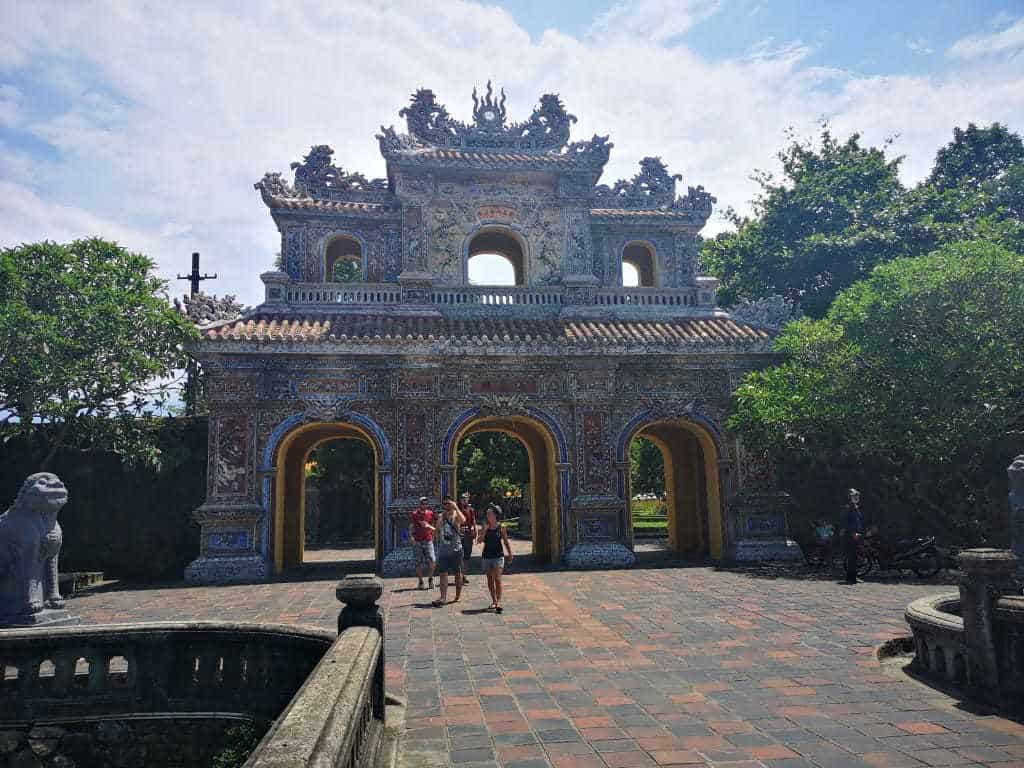
Day 8 – Hoi An
Explore the beautiful city, and enjoy some rest and relaxation at the beach, sitting on beach chairs and drinking cold coconuts.
The old town is simply stunning. As you walk around you’ll pass stores selling little souvenirs, great restaurants, and lots of clothes.
Hoi An is the place to be if you want to have some clothes made. Tailors are everywhere, and prices are affordable.
Make sure to head out into town at night, as the city lights up with hanging lanterns, and comes alive with markets, street food, and people.
While out and about visit the wooden Japanese Covered Bridge from the 18th Century, and take a boat ride up the river to get a better view of the lights.
Use Grab or take a taxi or scooter and head to the beach. You can sit at one of the many restaurants, use their lounge chairs and stay all afternoon soaking up the sun!
Where to stay in Hoi An: Spend the night in Hoi An, and fly from nearby Da Nang to Ho Chi Minh City the next morning.
READ MORE: Add these things to do in Hoi An to your itinerary!
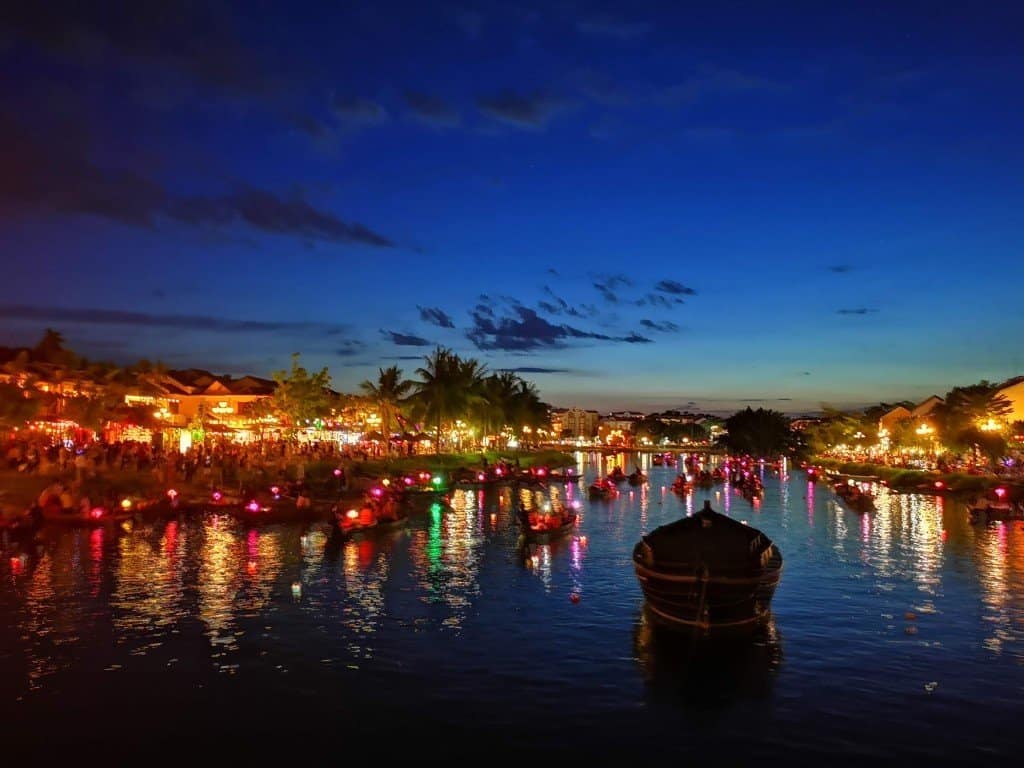
Day 9 and 10 – Explore Saigon, and take a full or half-day tour to the Cu Chi Tunnels OR The Mekong Delta
After experiencing incredible Hoi An, it’s time for one last big effort as we reach the home stretch of our 10-day itinerary.
Our time allows for one of two tour options, or if you have an extra day, both.
Vietnam’s largest city, Ho Chi Minh, is a bustling array of buildings, people, food and scooters!
Saigon is where a lot of ex-pats live as it offers so much variety and, like New York, the city never sleeps!
These are your last couple of days in Vietnam, and there is plenty to see. The Vietnam War Museum, Notre Dame (yes they have one too!), the beautiful Central Post Office, and Independence Palace are all must-see destinations while in HCMC.
One of the things to do in Ho Chi Minh City is to head to Bui Ven Walking Street, where all the action happens.
After dark, this street is packed with people sitting at small plastic tables and chairs sinking beers, eating street food, and people-watching.
After a few beers and some food, head back to your hotel and get some rest before your flight home.
READ MORE: Consider these 8 day trips from Ho Chi Minh City.
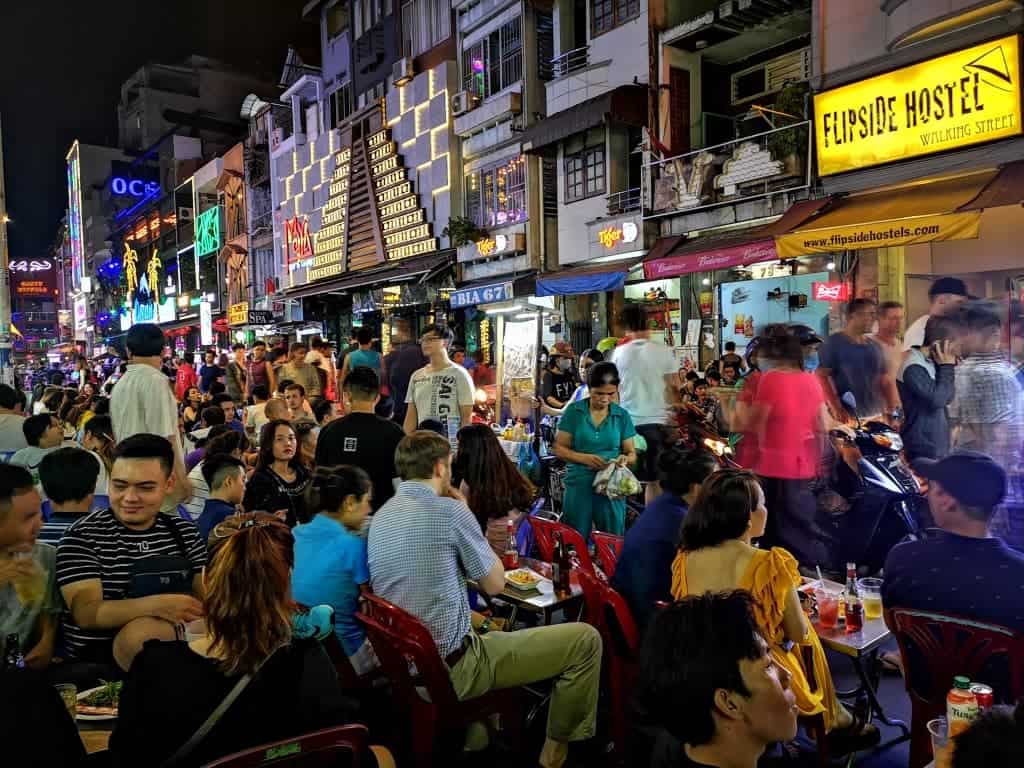
Tour Options
The Cu Chi Tunnels
Even if you’re not particularly interested in Vietnam’s war history, this is an interesting place to visit.
There are two different locations, Ben Dinh and Ben Doc.
Most tour companies usually head to the one closest to the city, Ben Dinh, which is also the largest.
The Tunnels offer an interesting insight into what it was like for the people fighting in the Vietnam/American War, their living conditions, and how they used the tunnels to hide underground during the day and fight the enemy at night.
Today you can go into some of the tunnels, which have been widened for westerners to fit in.
You can only visit the tunnels with a guide, which is provided as part of the entry ticket or part of your tour.
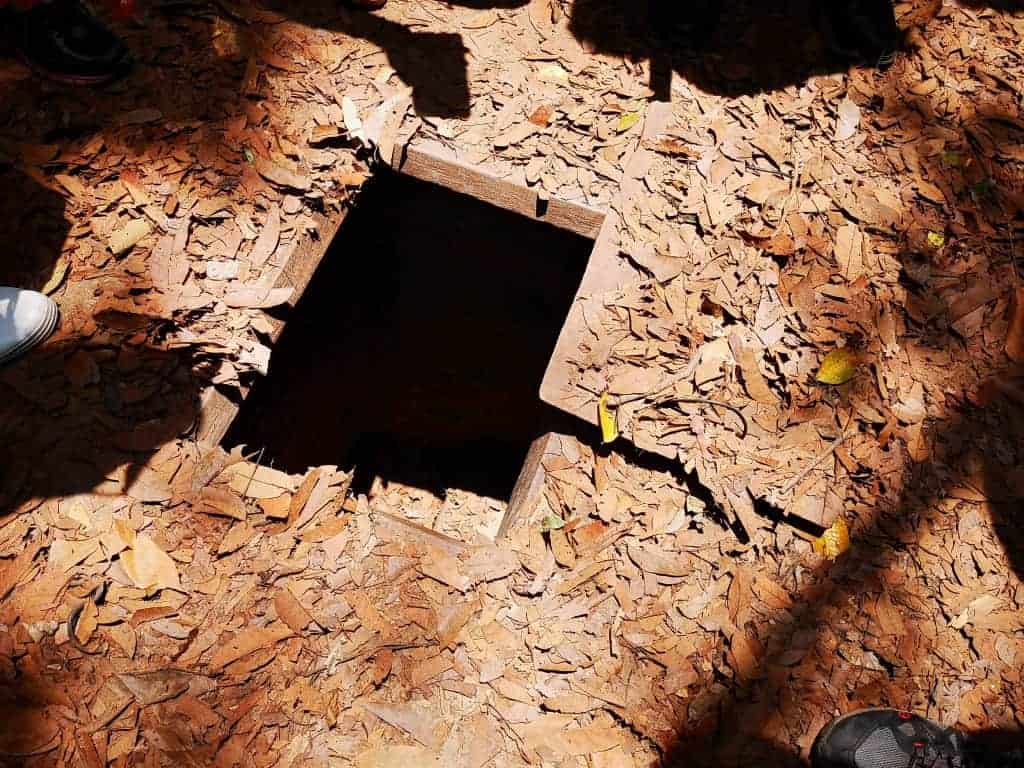
The Mekong Delta Tour
If small little tunnels aren’t your thing and you would prefer to take a pleasant boat ride down the Mekong river instead, there are half-day tours available from Ho Chi Minh City to the Mekong Delta.
Mekong Delta tours usually include exploring small canals by a sampan boat, visiting villages and islands, sampling exotic fruit and touring a coconut candy farm. Yum!
Where to stay in Ho Chi Minh City: For your two nights in Saigon, stay in District 1 to be right in the middle of everything, District 3 if you’d like a more relaxed stay that’s still only moments away from the action or District 4 for a real local experience.
Extension Option
Da Nang
Da Nang has lots to offer. If you are comfortable on a scooter or motorbike, you can ride from Hue to Da Nang (before going to Hoi An), through the Hai Van Pass.
This route used to be a little dangerous due to all the cars and trucks using the pass.
But since they have built the new freeway and tunnel there is very little traffic, making it a very enjoyable and incredibly scenic ride.
The best way to do this is by motorbike tour from Hue, to either Da Nang or to Hoi An, or in reverse.
Setting out from Da Nang, Ba Na Hills is a scooter ride away. You may recognize the bridge seemingly held up by two large hands.
Between Da Nang and Hoi An lies Marble Mountain, and to the east of Da Nang there’s a large Buddhist temple complex and pagoda called Chua Linh Ung.
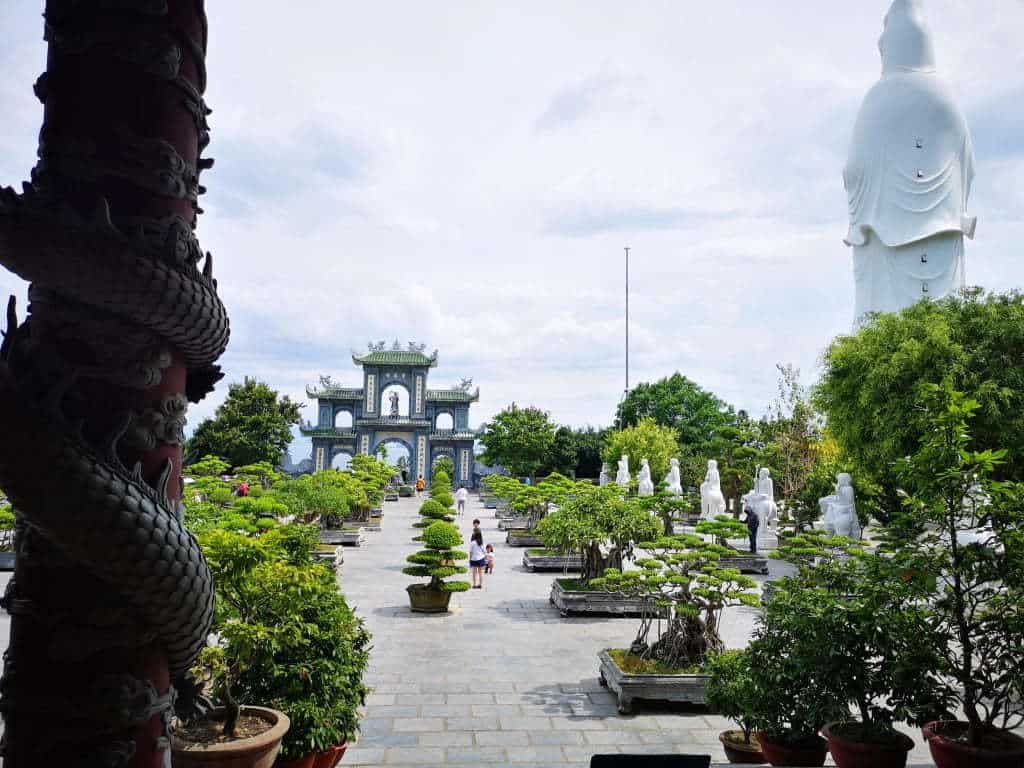
If you have longer in Vietnam and would like to explore more of this beautiful country, combine our North and South options below to create a two weeks in Vietnam itinerary.
1 Week in Vietnam Itinerary – The North
Day 1 – Hanoi
Hanoi is Vietnam’s capital city, with beautiful architecture, culture, and food.
While in Hanoi don’t forget to try egg coffee, fresh beer (Bia hơi), and especially the regional dish of Hanoi, Bun Cha. (See Above 10-day Vietnam Itinerary)

Where to stay in Hanoi: Spend the night in Hanoi. We recommend staying right in the Old Quarter.
READ MORE: Learn more about what to do in Hanoi with our Hanoi city guide.
Day 2 and 3 – Halong Bay
Halong bay, with its beautiful limestone islands, is on the UNESCO World Heritage List.
It’s a must-see while in Vietnam, with an overnight boat tour to the islands, and other fun activities like SUPing, kayaking, and exploring caves.
The easiest way to see Halong Bay is to organize a tour from Hanoi. (See Above 10-day Vietnam Itinerary)
Where to stay in Halong Bay: Spend the first night at Halong bay, preferably on board a junk boat. Alternatively, spend the night on Cat Ba Island. Return to Hanoi, and spend the second night there, ready to head to Sapa in the morning.
Day 4 and 5 – Sapa
Think of beautiful rice terraces set high up in the mountains, trekking, and staying in mountain lodges.
Sapa is located in the northwest part of the country, and best seen by a two-day tour from Hanoi. (See Above 10-day Vietnam Itinerary)
Where to stay in Sapa: Spend two nights in Sapa. Consider a mountain lodge for the true Sapa experience, and then hop on the bus back to Hanoi early the following day. Then fly from Hanoi to Hue.
If you would prefer not to fly, you can take an overnight train or bus from Hanoi to Hue instead, arriving in the morning of Day 7.
Day 6 – Hue
The old imperial city still has many secrets to uncover.
Hidden behind towering walls and large gates, you can explore where the last Emperor ruled from before abdicating his rule in favor of Ho Chi Minh.
This is where the North Vietnamese overtook the city, sparking a battle that lasted for almost a month in what was known as the Tet Offensive. (See Above 10-day Vietnam Itinerary)
Where to stay in Hue: Spend the night in town. Leave your bags at your hotel while you explore the city the next morning, then head to Hoi An after lunch.
The most spectacular way is on a motorbike tour through the Hai Van Pass. The operators will take you on the back of a motorbike, and deliver both you and your luggage to your hotel in Hoi An.
Alternatively, you can take a private car or bus.
READ MORE: Learn more about what to do in Hue with our Hue city guide.
Day 7 – Hoi An
Head to the beach during the day and relax on one of the many lounge chairs offered by the restaurants lining the foreshore of Central Vietnam.
In the evening enjoy the magical old town that comes alive at night with lights, markets, food, and more! (See Above 10-day Vietnam Itinerary)
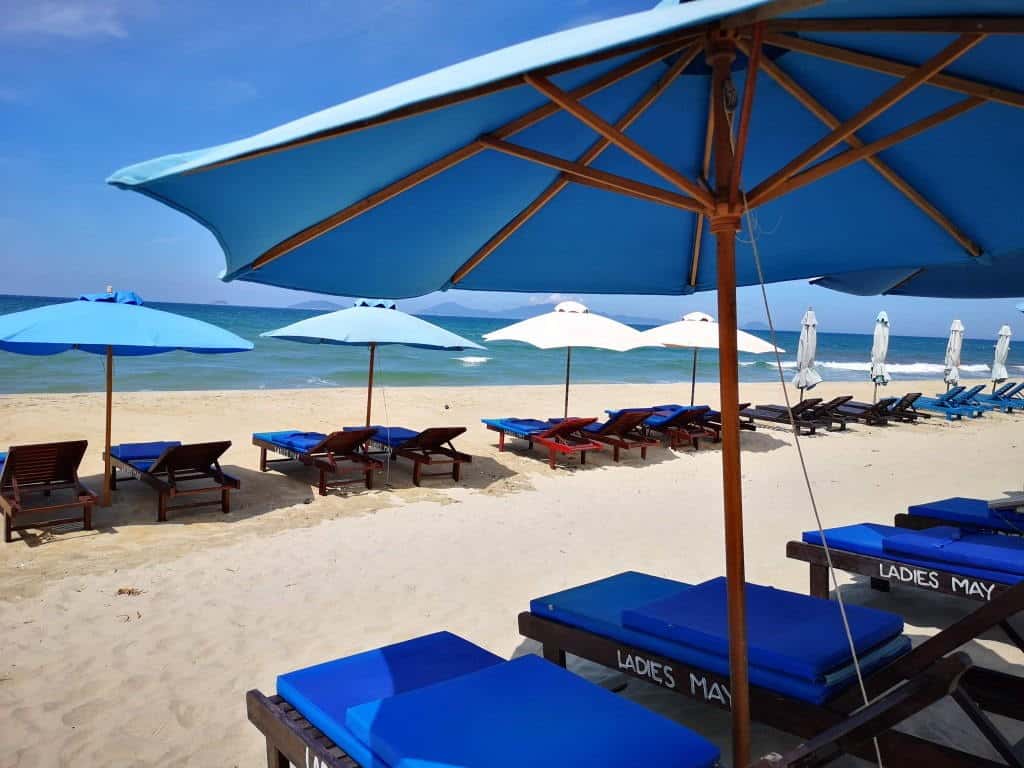
Where to stay in Hoi An: Spend the night in Hoi An, and fly from nearby Da Nang to Ho Chi Minh City, or head to Nha Trang to link up with the Southern Vietnam Itinerary below.
READ MORE: Add these things to do in Hoi An to your itinerary!
Extension Options
Ninh Binh (Near Hanoi)
Considered the inland version of Halong Bay, Ninh Binh is best seen by boat, on a pushbike, or scooter.
We spent two full days here and enjoyed a pushbike ride in the surrounding area.
We then hired a scooter and set out to see more of the beautiful lush hills, taking a boat ride through Tam Coc, and visiting pagodas.
You can easily book an awesome 2-day, 1-night tour of Ninh Binh from Hanoi if you’re not comfortable riding a scooter in the crazy Vietnam traffic.
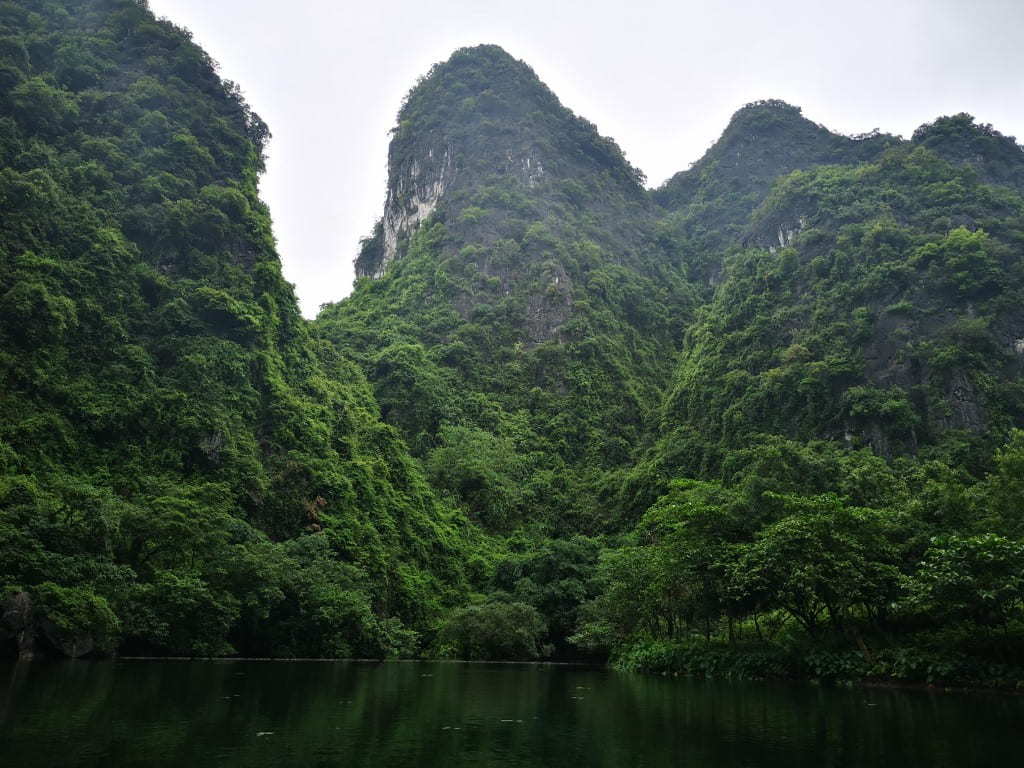
Phong Nha – Ke Bang National Park (near Hue)
Phong Nha – Ke Bang National Park is home to over 300 caves and grottoes. This UNESCO World Heritage Site protects the oldest karst system in Vietnam.
It comprises of a precious ecosystem, limestone forest, and the world’s largest cave, Son Doong.
The park offers eco-tourism, mountain climbing, trekking, flora and fauna, and caving.
Some of this can be done independently, but tours are often the best option to get the most out of your time.
My Son (Near Hoi An)
The My Son ruins are another important UNESCO World Heritage site in central Vietnam.
This temple complex was built by the Champas during their rule, and was influenced by Hinduism.
The ruins of the brick temples and sculptures are often likened to Angkor Wat in Cambodia or Bagan in Myanmar.
Book a tour of My Son to make the most of your experience.
Ba Be National Park (Near Sapa)
Ba Be Lake is the centre of the National Park, and of the Ba Be Lake legend.
People believe that the lake was formed by an enchantress, who cursed the people of the surrounding area for not showing compassion to her when she asked for help.
Legends aside, Ba Be Lake offers a wide range of activities, from trekking, kayaking, motor-biking, waterfalls, caves, and the natural beauty and diversity of the area.
Bach Ma National Park (between Dan Nang and Hue)
The highest point of Bach Ma National Park is the 1450m high mountain of the same name.
The park is known for its biodiversity, with lots of birds, flora, mammals, and primates.
The government finally protected the area in 1962, after the area was greatly damaged due to the use of agent orange during the Vietnam War.
The area is now safe for people to explore and is best seen with a tour guide.
You can hike the Five Lakes Cascade Trail taking in the waterfalls, visit the monastery, and hike the Pheasant Trail.
Dong Ha – for DMZ tour (Between Dong Hoi and Da Nang)
A visit to the demilitarized zone (DMZ), is a great one-day outing for history buffs.
The DMZ area was the dividing line between North and South Vietnam during the war, and as a result, saw heavy fighting.
The tour explains the extent of the fighting in this area, and the importance of the location in the Vietnam War.
1 Week in Vietnam – The South
Day 1 – Nha Trang
Our Southern itinerary begins in Nha Trang. Either fly there from Saigon or Hanoi, or take a bus down from Hoi An if you’re continuing on from our Northern Itinerary.
Nha Trang is the most famous seaside resort in Vietnam and is known for its white-sand beaches, coastal islands, and clear waters with abundant marine life, making it perfect for scuba diving and snorkelling.
The town itself also offers interesting cultural sites close by, and places where you can pamper yourself with a mud-bath, or enjoy a seafood dinner.
Where to stay in Nha Trang: Spend a night in Nha Trang, and take a bus or private car to Dalat the next morning.
Day 2 – Dalat
After a relaxing time on the beach, it’s time to get some more culture in!
Dalat is heavily influenced by the colonial period from the French occupation, as the French built their holiday homes here to take advantage of the temperate weather.
With beautiful buildings, gardens, interesting architecture, coffee and tea plantation tours, waterfalls, mountain biking, hiking, and canyoning, you don’t want to miss out on this city!
Where to stay in Dalat: Spend the night in Dalat, and take a bus or private car to Mui Ne the next morning.
READ MORE: Learn more about what to do in Dalat with our Dalat city guide.
Day 3 – Mui Ne
Three main things are offered in this beautiful resort destination; relaxation, watersports, and sand dunes.
Mui Ne beach is dotted with resorts, hotels, and hostels, and is a great place to just sit and enjoy your surroundings.
Although Mui Ne is more than just the beach, this area is set up for tourists and has one main street of shops, cafes, bars, and shopping.
Being a beach town, watersports are a big thing here, and just about everything is on offer from kitesurfing to parasailing.
The Mui Ne sand dunes are popular, and a spectacular sight.
There are two locations, the smaller, closer, red sand dunes, and the white sand dunes about 26km from town.
Tours are available for both locations and you can also hire dune buggies, or go sledding!
Where to stay in Mui Ne: Spend a night in Mui Ne, then shake the sand from your belongings and take a bus or the train to Ho Chi Minh City (Saigon) the next morning.
Day 4 and 5 – Ho Chi Minh City
There’s so much to see and experience in this historic city, including day tours to some pretty important locations, that you’ll need two days.
On the first day, you’ll head out into Ho Chi Minh City. It has some great cultural sites, like the Vietnam War Museum, Independence Palace, Notre Dame, and it also boasts some pretty great nightlife too.
For the second day, we suggest you head out of the city on a day tour. There are two great options: The Chu Chi Tunnels, or a trip to the Mekong Delta. (See Above 10-day Vietnam Itinerary)
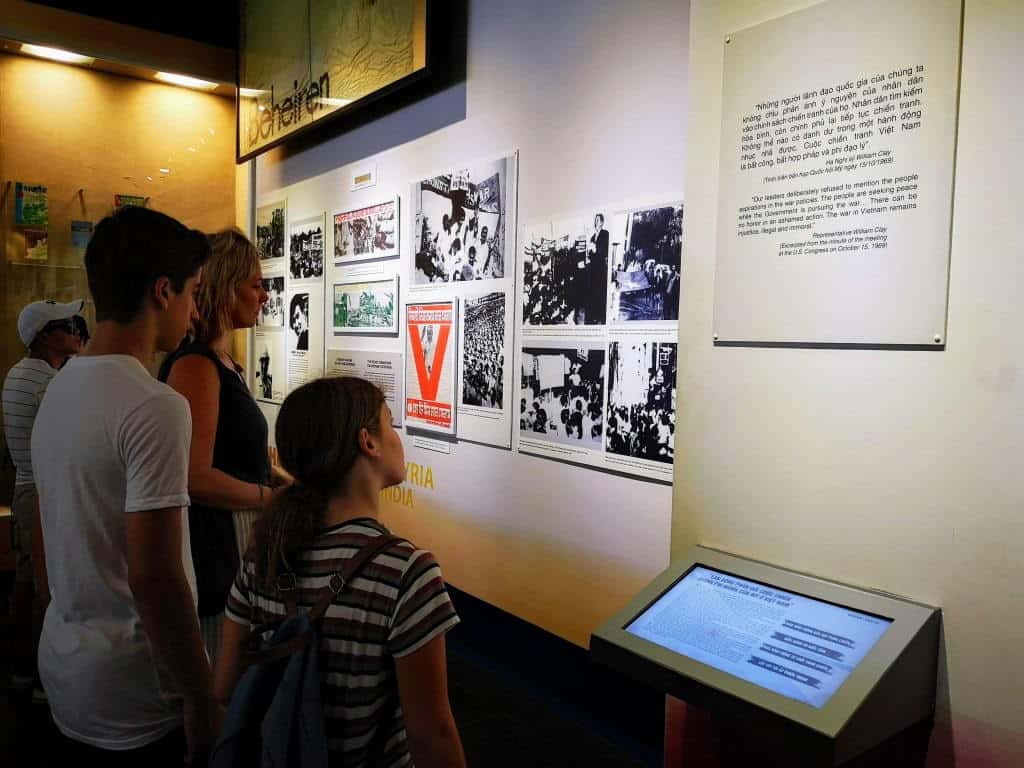
Where to stay in Ho Chi Minh City: For your two nights in Saigon, stay in District 1 to be right in the middle of everything, District 3 if you’d like a more relaxed stay that’s still only moments away from the action or District 4 for a real local experience.
Fly to Phu Quoc Island on Day 6.
Day 6 and 7 – Phu Quoc Island
Phu Quoc is a small island off the coast of Cambodia, lined with white sand beaches and palm trees.
There are many resorts along the southwest coast providing you with ample opportunity for some relaxation time, while you swim, and eat your last fill of tasty Vietnamese food.
Phu Quoc island is home to mountains, tropical rainforest, hiking and wildlife, all within its National Park.
Lots of tours are available to explore the island which offers snorkelling as well, or you can hire a scooter and set off by yourself.
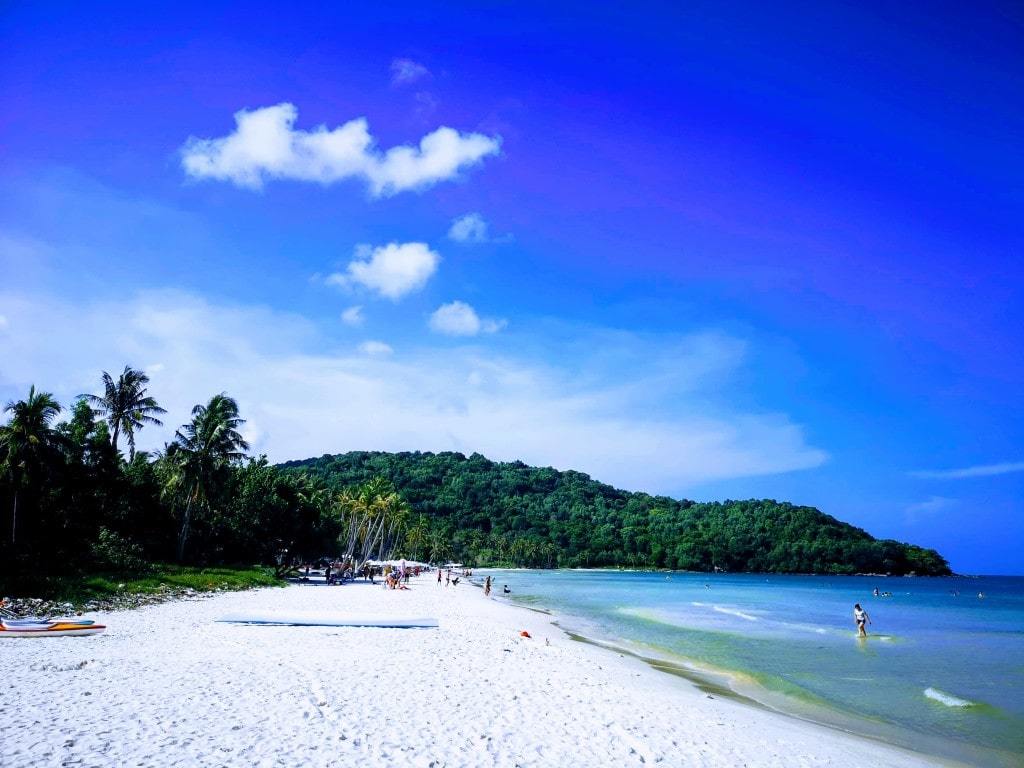
Where to stay in Phu Quoc Island: Spend two relaxing nights on Phu Quoc Island, then fly back to Saigon to catch your onward flight!
If you have more time to spend, take the ferry to the mainland, and continue overland to some of the extension options listed below, or to Cambodia.
Extension Options
Cu Chi Tunnels or The Mekong Delta
Depending on what you did in 7 days for our Southern Vietnam Itinerary, if you have time you might like to see the other option best explored out of Ho Chi Minh City. (See Above 10-day Vietnam Itinerary)
Con Dao Island
During the French occupation, and later the Saigon regime, this island was used to house political prisoners and prisoners that were considered especially dangerous.
Aside from its harrowing past, the island is known for its natural beauty with over 80% of the island being a National Park.
These days the island is frequented for its spectacular snorkelling and diving, with abundant coral reefs, beautiful beaches, and hidden lagoons.
Can Tho
Can Tho is the de facto capital of the delta region and an unassuming city full of life.
Most of the activity happens around the pier where you can enjoy great food and cold beer.
Boat rides are available to show you more of the city and surrounding area, and visit some early-morning markets.
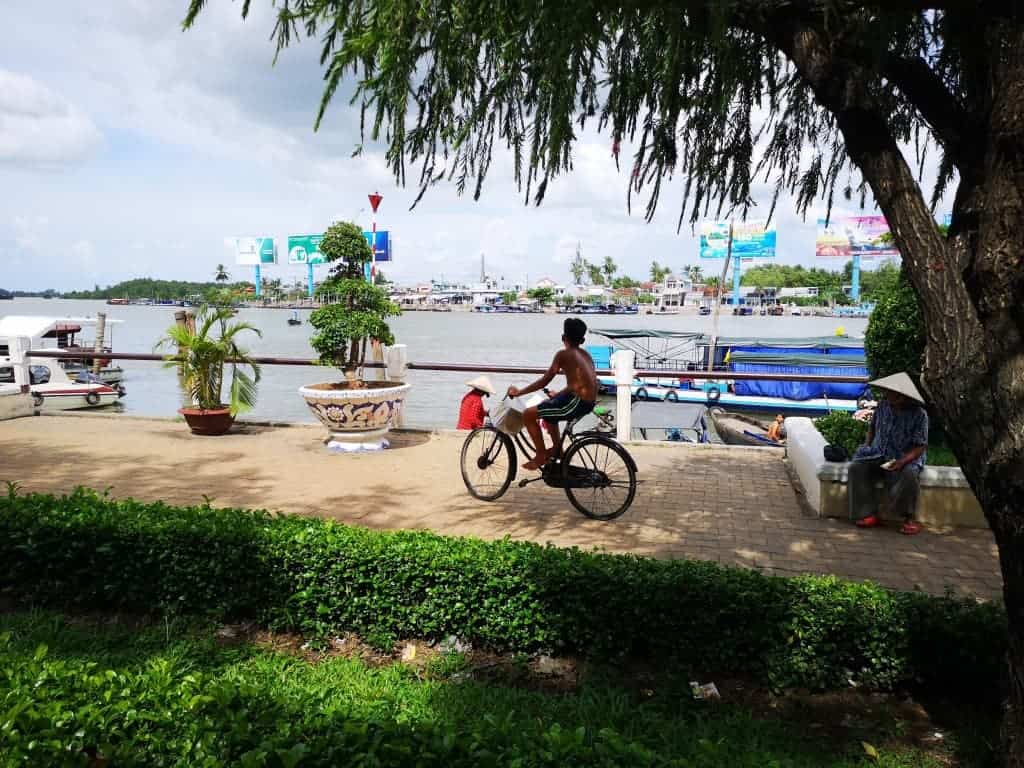
Qui Nhon
If you’d like a little break from the tourists and are looking to just relax and hang out with the locals, Qui Nhon is the place to come.
Unspoiled by tourism, this sleepy town has squeaky white sand beaches, snorkeling, swimming, temples, and museums.
Cat Tien National Park
Cat Tien National Park is comprised of two sections Cat Loc, and Nam Cat Tien, the former being the most visited of the two.
The river by Nam Cat Tien houses an important Hindu archaeological site and temple, where a large number of artifacts have been uncovered and are now in the Dalat museum.
The national park has spectacular flora and fauna and trekking.
READ MORE: 33 amazing things to do in Vietnam!
Did You Find My Vietnam Itinerary Helpful?
Vietnam is a large and diverse country, with a great deal to offer the traveller who goes in with an open mind and heart.
While we’ve listed what we feel are the main highlights, there is much more to be explored when you visit Vietnam.
Friendly people really make Vietnam a special place to visit.
The itineraries listed above are a bare minimum if you need to get the most out of a short amount of time.
While doable, if possible it would be a much more relaxing trip if you could pad it out by adding a few days to your Vietnam itinerary, and slow down a little!
We hope you have a wonderful time there!
DISCLAIMER: Some of the links in this article are affiliate links, which means if you book accommodation, tours or buy a product, we will receive a small commission at no extra cost to you. These commissions help us keep creating more free travel content to help people plan their holidays and adventures. We only recommend the best accommodations, tours and products, and regularly review these. Thanks for your support, kind friend!

![The PERFECT Vietnam Itinerary for 1, 2 or 3 Weeks [2022] The PERFECT Vietnam Itinerary for 1, 2 or 3 Weeks [2022]](https://www.nomadasaurus.com/wp-content/uploads/2020/01/Vietnam-Rice-Paddies-min.jpg)
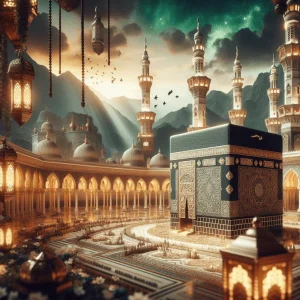


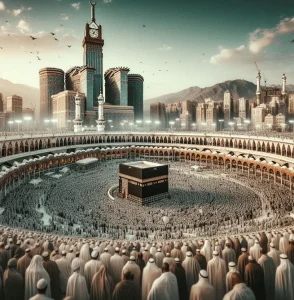
More Stories
15 fun things to do in Lynton and Lynmouth, Devon
The most popular hotel chains in America
Best Dog Stroller For Hiking And Walking Off-Road | 2022